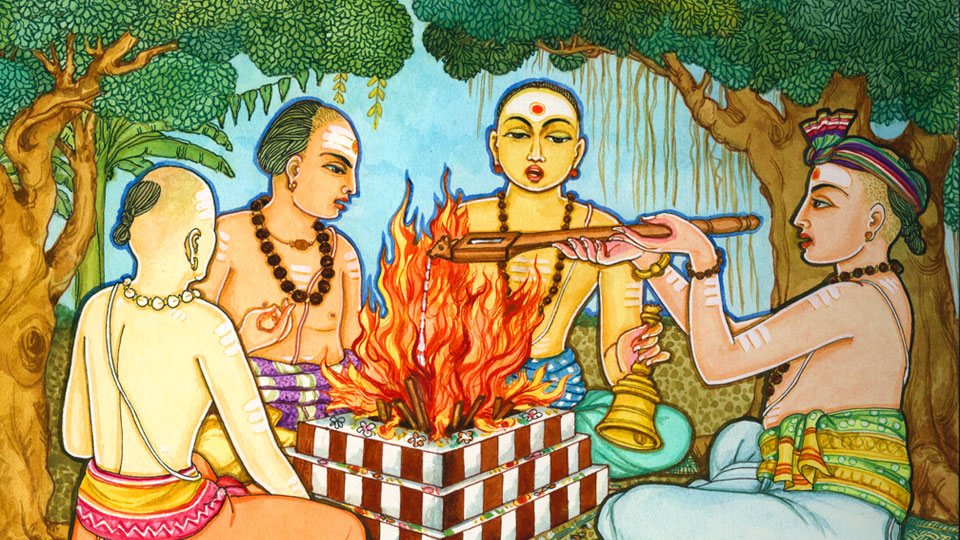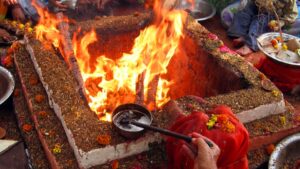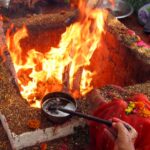Fire Worship for Environment
The place of fire worship is the Havan-Kund. It is one of the vital parts of Yajna. Moreover, it is a symbol, that inspires us to go to apex in status. In our scriptures people worship fire as God and contains heat and steam both. It burns as well as gives light. When it is in form of steam, it makes water. The water is a necessity to not only human being but also for the whole world and it is an elixir of life. Hence, we worship fire as God. In every religion and cult, by the way or other, the people worship fire.
Yajna
Yajna is the path to reach the eternal. It is a medium to be close to him. The fire and flame of Yajna is the form of Lord Vishnu and Narayana and hence its name is Vaishwanar. The most convenient place to establish the importance of Yajna is the heart of the person. The fire forms its demesne quality, the people try themselves to make them in the form of fire and make the life full of Yajna.
For performing Yajna, arrange the fuel woods as per the system mentioned in our scriptures and put aromatic materials for the oblation. When worshipping the fire, the scrumptious form of Lord Vishnu one must keep in the mind and all his qualities he must adopt by the performer. The performer should pray with following spell.
“ॐ अयन्त इध्म आत्मा जातवेदसे इध्मस्वचवर्धस्व इद्धय वर्धय”
“Om ayanat idhma atma jatvedse idhmashychavrdhsya idhya vardhya”
Means, O fire god, you please burn and light ourselves. The qualities you have, let me hold. In this process the true adorer will devote himself towards the deity and hold his qualities.
Agnihotra
Yajna is also called Agnihotra. Fire is the Yajna deity. To holocaust the materials to the fire of Yajna, considering the fire as God, termed as Agnihotri. To feel the closeness of eternal form of fire, and remembering his specialities, one should try to adopt the qualities of fire.
- The way the behaviour of fire is warmness, in that way our behaviour should be scrumptious. Lie, idleness, timid, dirty, despair, depression all of these are delinquencies, which are just opposite to the quality of fire. Our nerves and veins should carry warm blood like fire. Our arms should always remain ready to perform work, our brain should be progressive, and it should work for the betterment and against evils.
- The materials put into the fire, burn with the flame, and becomes the part of the fire. In this way the persons close to us, should adhere to the qualities of the person offering oblation.
- If fire burns, it does not allow diminishing its warmness. We should keep that warmness with us and must not allow it to extinguish till we are alive.
- According to ‘‘”भस्मान्तं शरीरम्‘‘ (Bhasmantam Shariram) our meal is also the meal of fire. The fire of our body digests our food.
- The way fire with its ignition temperature burns other things, we should hold those qualities which we want from others. The qualities we belong, the others with similar character will come to us and our family will also form in the same way. Hence, the environment we should make according to us.
- The fire never turns profane by touching profane things. It sanctifies the profane materials. Other’s evils must not influence us. We should not be a bad man, but we should change the bad man into a good person.
- Wherever the fire remains, the light prevails. We should adore Brahma and should eliminate the darkness of nescience. ”तमसो मा ज्योतर्गमय‘‘ Means bring us in light from darkness of nescience.
- The way the flame of the fire remains upwards, similarly our aim to move upward in progress.
- Whatever is given to fire, it makes it in particles and distribute it to the atmosphere. The thing we get from the nature, we should take that much which is our bare minimum need, the balance is to be given as bounty to the person who could not get anything. In Yajna, whatever we give to the fire, fire never keeps anything for him, neither stores it, instead it gives everything to atmosphere for the welfare of the human beings. Hence, whatever, wisdom, power, and erudition we achieve, those should be used not for oneself, but for the mass.
- The way fire burns in the Yajna-Kund, in the same way the fire of knowledge should burn inside us. This is the spiritual form of fire.
- The human being had relations since evolution and as they landed on the earth, necessity starts evolving. The human life during the ancient period was fully dependent on nature and hence human beings were close to nature and had a cordial relation. In modern era, the need of human being gone to the extreme and for fulfilling their demands they started exploiting the nature non-judiciously. The result is the pollution of atmosphere. And for the pollution the entire universe is in danger.
- The tradition of Yajna is prevailing since ancient period. The sages performed Yajna even staying into the forests. The system of Panch Mahayajna is still prevailing. During the religious rituals, they believe that the trees are the abode of gods, hence they worshipped the trees. The sages and austere used to believe that Yajna is the way to success and sanctification. That was the cause that they were living without any ailment and had long life.
- During the medieval period, Dayanand Saraswati, found that the Yajna was on the verge of elimination and hence he reinstated the system Yajna and told that “एते पंच महायज्ञा मनुष्यैर्नित्यं कर्त्व्याः” “Eto Panch Maha Yajna Manushyenrityam Kartyavya:” The Yajna is related to mind and the minds is related to providential culture. Hence Manu had described that “ऋषि यज्ञं देव यज्ञं भूत यज्ञं च सर्वदा, नृयज्ञं, पितृयज्ञं च यथा शक्ति न हाययेत्” Hrishi yajnam Dev Yajnam Bhoot Yajnam Sarvada, Nriyajnam, Pitriyajnam cha yatha Shakti Na Hayayet”. It means that everyone recommended Yajna.
अग्नि पूजा, तमसो मा ज्योतर्गमय
अग्नि की पूजन का स्थान हवन-कुण्ड(यज्ञकुण्ड) ही माना गया है, अग्नि यज्ञ का अहम हिस्सा है, जो शक्ति का प्रतीक है, जो हमें जीवन में सदा ऊपर उठने की और प्रेरित करती है। शास्त्रों में अग्नि को “ईश्वर” भी कहा गया है, इसी अग्नि में ताप और भाप दोनों छिपे है। यही अग्नि जलाती भी है, तो प्रकाश भी देती है। जब अग्नि भाप बनती है, तो जल की प्राप्ति होती है, जल मात्र मानव जीवन के लिए ही नहीं बल्कि पूरी प्रकृति, पुरे संसार के लिए वरदान है, अमृत है। इसीलिए अग्नि इतनी पूजनीय है। अग्नि की हर धर्म एवं संप्रदाय में किसी न किसी रूप में अग्नि का पूजन होता है।
यज्ञ (हवन)
यज्ञ परमात्मा तक पहुंचने का रास्ता है, उसका सान्निध्य पाने का माध्यम है। यज्ञ में प्रकट अग्नि साक्षात् भगवान विष्णु और नारायण इसलिए अग्नि को “वैश्वानर” भी कहा जाता है।यज्ञ की सूक्ष्म महत्वता को स्थापित करने का वास्तविक स्थान मनुष्य का हृदय (मन) है। अग्नि के स्वत्व गुण को धारण करके मनुष्य अपने को अग्नि रूप, अग्नि गुण-सम्पन्न बनाने का प्रयत्न करता हैं, तभी उनका जीवन अग्नि रूप यज्ञमय बनता है।
अग्नि पूजन करने के लिये हवन कुंड सजाकर,उचित व् सुगन्धितसामग्रियों से हवन कुंड में आहुतियाँ दी जाती हैं। अग्नि की पूजा करने के लिए अग्नि रूपी तेजस्वी “भगवान् विष्णु”को अपने मन में धारण करना होता है और उनके गुणों को अपनाकर स्वयं अग्नि रूप बनना होता है। अग्नि देवताको यजमान को ऐसी प्रार्थना करनी होती है-
“ॐ अयन्त इध्म आत्मा जातवेदसे इध्मस्वचवर्धस्व इद्धय वर्धय”।
अर्थात्- ‘हे अग्निदेव, आप प्रदीप्त(ज्वल) हो और हमें भी प्रदीप्त करो। जो गुण आप में हैं, उन्हें ही हम धारण करें, ऐसी प्रार्थना इस मन्त्र में की गई है। इस प्रकार अग्नि देवताका सच्चा उपासक वही होगा, जो अपने इष्टदेव में मग्न होकर, अग्नि देवता के गुणों को स्वयं भी धारण करे।
अग्निहोत्र
यज्ञ को “अग्निहोत्र” भी कहते हैं। अग्नि ही यज्ञ के प्रधान देवता मानी गयी है। हवन-सामग्री को अग्नि के मुख में डालना ही अग्नि को ईश्वर-रूप मानकर उसकी पूजा करना अग्निहोत्र है। अग्नि रूपी परमात्मा की निकटता का अनुभव करने से उसके गुणों को भी अपने में धारण करना चाहिए एवं उसकी विशेषताओं को स्मरण करते हुए अपने आपको अग्निवत् होने की दिशा में अग्रसर बनाना चाहिए-
- जिस प्रकार अग्नि का स्वभाव उष्णता है। उसी प्रकार हमारे विचारों और कार्यों में भी तेजस्विता होनी चाहिए। झूठ, आलस्य, शिथिलता, मलीनता, निराशा, अवसाद यह सब अवगुण हैं, जो अग्नि के गुणों से पूर्ण विपरीत हैं। जिस प्रकार अग्नि सदा गरम रहती है, कभी भी ठण्डी नहीं पड़ती, उसी प्रकार हमारी शरीर की नसों में भी सदा उष्ण रक्त(गर्म खून) बहना चाहिए, हमारी भुजाएँ, काम करने के लिए फड़कती रहें, हमारा मस्तिष्क प्रगतिशील, बुराई के विरुद्ध एवं अच्छाई के पक्ष में उत्साहपूर्ण कार्य करता रहे।
- अग्नि में जो भी वस्तु जाती है, उसे वह अपने समान बना लेती है। नजदीकी लोगों को हम भी अपना गुण, ज्ञान एवं सहयोग देकर उन्हें अपने समान बनाने का प्रयत्न करें।
- अग्नि जब तक जलती है, तब तक उष्णता को नष्ट नहीं होने देती। हम भी जब तक जीवन जिए तब तक अपने आत्मबल से ब्रह्म तेज को मृत्यु काल तक बुझने न दें।
- ”भस्मान्तं शरीरम्‘‘ अनुसार, हमारे शरीर का भोजन भी अग्नि का ही भोजन है।, हमारे शरीर की अग्नि ही उस भोजन को पचाती है।
- अग्नि जिस प्रकारपहले अपने में ज्वलन शक्ति धारण करती हैं, तब किसी दूसरी वस्तु को जलाने में समर्थ होती है। उसी प्रकार हम स्वयं उन गुणों को धारण करें जिन्हें दूसरों में देखना चाहते हैं। उपदेश देकर नहीं, वरन् अपना उदाहरण उपस्थित करकेही हम दूसरों को कोई शिक्षा दे सकते हैं। जो गुण हम में वैसे ही गुण वाले दूसरे लोग भी हमारे समीप आयेंगे और वैसा ही हमारा परिवार बनेगा। इसलिये जैसा वातावरण हम अपने चारों ओर देखना चाहते हों, पहले स्वयं वैसा बनने का प्रयत्न करें।
- अग्नि कभी मलिन वस्तुओं को स्पर्श करके स्वयं मलिन नहीं बनती, वरन् दूषित वस्तुओं को भी अपने समान पवित्र बनाती है, वैसे ही दूसरों की बुराइयों से हम प्रभावित न हों। स्वयं बुरे न बनने लगें, वरन् अपनी अच्छाइयों से उन्हें प्रभावित करके पवित्र बनाएं।
- अग्नि जहाँ रहती है,वहांप्रकाश फैलता है। हम भी ब्रह्म-अग्नि के उपासक बनकर ज्ञान का प्रकाश चारों ओर फैलाएं, अज्ञान के अन्धकार को दूर करें। ”तमसो मा ज्योतर्गमय‘‘ हमारा प्रत्येक कदम अन्धकार से निकल कर प्रकाश की ओर चलने के लिये बढ़े।
- जिस प्रकारअग्नि की ज्वाला सदा ऊपर को उठती रहती है।उसी प्रकार हमारा लक्ष्य, उद्देश्य एवं कार्य सदा ऊपर की ओर हो।
- अग्नि में जो भी वस्तु डालेंवह उसे अपने पास नहीं रखती, वरन् उसे सूक्ष्म बनाकर वायु को, देवताओं को, बाँट देती है। हमें जो वस्तुएँ ईश्वर की ओर से, संसार की ओर से मिलती हैं, उन्हें केवल उतनी ही मात्रा में ग्रहण करें, जितने से जीवन रूपी अग्नि को ईंधन प्राप्त होता रहे। शेष का परिग्रह, संचय या स्वामित्व का लोभ न करके उसे लोक-हित के लिए ही अर्पित करते रहें। अग्नि में चाहे करोड़ों रुपयों की सामग्री होजाय पर वह अपने व्यक्तिगत स्वार्थ के लिए कुछ नहीं चुराती और न पीछे के लिए संग्रह करती है, वरन् तत्क्षण उस सामग्री को सूक्ष्म बनाकर वायु द्वारा लोक-हित के लिए बाँट देती है। वैसे ही हमें जो ज्ञान, बल, बुद्धि, विद्या आदि उपलब्ध हैं, उनका उपयोग स्वार्थ के लिये नहीं, परमार्थ के लिये ही करें।
- जैसे अग्नि हवन कुण्ड में जलती है, वैसे ही ज्ञानाग्नि अन्तःकरण (मन) में, तप-अग्नि इन्द्रियों में, कर्म अग्नि देह में, प्रज्जवलित रहनी चाहिए। यही अग्नि का आध्यात्मिक स्वरूप है।
पर्यावरण प्रदूषण
प्रकृति और मानव का सृष्टि के आरंभ से ही आपस में संबंध रहा है और मानव के पृथ्वी पर आभिर्भाव के साथ ही आवश्यकताओं का भी सत्य उदय हुआ। आदि मानव का जीवन पूर्णतः प्रकृति पर निर्भर था। अतः मानव और प्रकृति में एक सामंजस्य था, किंतु आधुनिक युग में मानव की आवश्यकताएं चरम पर हैं, जिसकी पूर्ति के लिए मानव ने प्रकृति का निर्दयतापूर्वक दोहन शुरू कर दिया। परिणाम आप सबके सामने है- ‘पर्यावरण प्रदूषण’, जो आधुनिकता की देन हैं। प्रदूषण के कारण ही पूरा ब्रह्मांड संकट में है।
यज्ञ की परंपरा प्राचीनकाल से रही है। ऋषि वनों में रहते हुए प्रातः सायं दैनिक यज्ञ किया करते थे। पंच महायज्ञों का प्रचलन था। धार्मिक अनुष्ठान के समय वृक्षों में भगवान का वास मानकर पीपल, बरगद, आम, अशोक, बिल्व, पारिजात, आंवला आदि की पूजा की जाती थी। ऋषि-मुनि, यज्ञ को सफलता और सिद्धिकारक मानते थे और वायुमंडल की शुद्धि का कारक भी मानते थे। यही कारण था कि उस समय लोग निरोग और दीर्घायु होते थे।
मध्यकाल में यज्ञ को विलुप्त सेहोतेदेख “महर्षि दयानंद” ने यज्ञ को ज्ञान, विज्ञान का कारक बनाकर उसे आध्यात्मिक मंच पर पुनः प्रतिष्ठित किया और कहा, “एते पंच महायज्ञा मनुष्यैर्नित्यं कर्त्व्याः” यज्ञ का संबंध मन से है और शुभ संस्कार मन के साथ रहते हैं। इसीलिए मनु ने भी कहा है, “ऋषि यज्ञं देव यज्ञं भूत यज्ञं च सर्वदा, नृयज्ञं, पितृयज्ञं च यथा शक्ति न हाययेत्” कहने का तात्पर्य यह कि सभी ने यज्ञ करने पर जोर दिया।
उदाहरणस्वरूप यज्ञ को ही लें यज्ञ एक ठोस वैज्ञानिक प्रक्रिया है, जो हमारे जीवन का अभिन्न अंग है। महर्षि दयानंद ने भी कहा था, “यदि पर्यावरण की शुद्धि एवं सुखों की वृद्धि चाहते हो तो नित्य प्रातः सायं प्रत्येक घर में हवन-यज्ञ करो।






